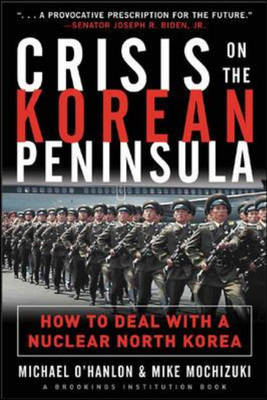
Crisis on the Korean Peninsula
How to Deal With a Nuclear North Korea
Seiten
2003
McGraw-Hill Publishing Co. (Verlag)
978-0-07-143155-2 (ISBN)
McGraw-Hill Publishing Co. (Verlag)
978-0-07-143155-2 (ISBN)
- Keine Verlagsinformationen verfügbar
- Artikel merken
Many of the nation's top experts feel that North Korea is a more imminent threat than Saddam's Iraq war. The authors' examine this issue in detail and also offer a comprehensive blueprint for diffusing the crisis with North Korea. Their solution comes in the form of a "grand bargain" with North Korea.
"In describing their comprehensive proposal for negotiations with North Korea, O'Hanlon and Mochizuki exhibit the strategic creativity and analytical depth badly needed by United States policy makers dealing with this strange, dangerous place." - Ash Carter, former Assistant Secretary of Defense and Ford Foundation Professor of Science and International Affairs, John F. Kennedy School of Government, Harvard University. In early 2002, in his fateful state of the union address, President Bush described North Korea as being a member of the "Axis of Evil." Since then, the U.S. has gone to war with Iraq, and the world now wonders what the future of Bush's preemption policy will bring. Many of the nation's top experts feel that North Korea is a more imminent threat than Saddam's Iraq was. They have a nuclear program, a million-man army, and missiles to deploy and export. In "Crisis on the Korean Peninsula", Michael O'Hanlon, a Senior Fellow at Brooking and visiting lecturer at Princeton, and Mike Mochizuki, endowed chair in Japan-US Relations at G.W. University, not only examine this issue in detail but also offer a comprehensive blueprint for diffusing the crisis with North Korea.
Their solution comes in the form of a "grand bargain" with North Korea. Accords could be negotiated step-by-step, however they need to be guided by a broad and ambitious vision that addresses not only the nuclear issue but also the conventional forces on the hyper-militarized peninsula and the ongoing decline of the North Korean economy.
"In describing their comprehensive proposal for negotiations with North Korea, O'Hanlon and Mochizuki exhibit the strategic creativity and analytical depth badly needed by United States policy makers dealing with this strange, dangerous place." - Ash Carter, former Assistant Secretary of Defense and Ford Foundation Professor of Science and International Affairs, John F. Kennedy School of Government, Harvard University. In early 2002, in his fateful state of the union address, President Bush described North Korea as being a member of the "Axis of Evil." Since then, the U.S. has gone to war with Iraq, and the world now wonders what the future of Bush's preemption policy will bring. Many of the nation's top experts feel that North Korea is a more imminent threat than Saddam's Iraq was. They have a nuclear program, a million-man army, and missiles to deploy and export. In "Crisis on the Korean Peninsula", Michael O'Hanlon, a Senior Fellow at Brooking and visiting lecturer at Princeton, and Mike Mochizuki, endowed chair in Japan-US Relations at G.W. University, not only examine this issue in detail but also offer a comprehensive blueprint for diffusing the crisis with North Korea.
Their solution comes in the form of a "grand bargain" with North Korea. Accords could be negotiated step-by-step, however they need to be guided by a broad and ambitious vision that addresses not only the nuclear issue but also the conventional forces on the hyper-militarized peninsula and the ongoing decline of the North Korean economy.
Michael O'Hanlon, Ph.D., is a senior fellow at the Brookings Institution in Washington, D.C. and teaches at Princeton and Columbia universities. Dr. O'Hanlon's work has been published in the New York Times, the Wall Street Journal, Foreign Affairs, and other influential publications, and he has appeared on networks from ABC and NBC to CNN, MSNBC, Fox, A&E, and others. Mike M. Mochizuki, Ph.D. holds the Elliot's School's endowed chair in Japan-U.S. Relations at George Washington University, and is one of the nation's top authorities on northeast Asia. Dr. Mochizuki was formerly a senior fellow at Brookings as well as codirector of the Center for Asia Policy at Rand.
| Erscheint lt. Verlag | 19.8.2003 |
|---|---|
| Reihe/Serie | A Brookings Institution Book |
| Verlagsort | London |
| Sprache | englisch |
| Maße | 137 x 211 mm |
| Gewicht | 447 g |
| Themenwelt | Sozialwissenschaften ► Politik / Verwaltung ► Europäische / Internationale Politik |
| Sozialwissenschaften ► Politik / Verwaltung ► Vergleichende Politikwissenschaften | |
| Schlagworte | Kernwaffen • Nordkorea; Politik/Zeitgesch. |
| ISBN-10 | 0-07-143155-1 / 0071431551 |
| ISBN-13 | 978-0-07-143155-2 / 9780071431552 |
| Zustand | Neuware |
| Haben Sie eine Frage zum Produkt? |
Mehr entdecken
aus dem Bereich
aus dem Bereich
Studienbuch
Buch | Hardcover (2023)
De Gruyter Oldenbourg (Verlag)
44,95 €
erfolgreiche Interessenvertretung durch Prozesskompetenz im komplexen …
Buch | Hardcover (2023)
Wiley-VCH (Verlag)
42,00 €


